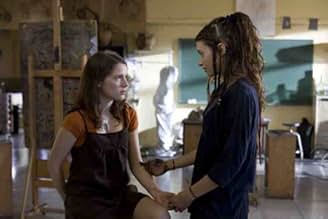The obvious thrust of the narrative is toward a central lesbian romance, plainly seen even in film posters, and queer representation that is welcome. But 'Eloïse's lover' also endeavors to present a more complete narrative all the while, with a progression toward that relationship that feels more natural, compared to other pictures one could name.
One can't help but feel that the premise, as described anywhere that one may read it or see it depicted, is a bit misleading. Before we know it half the runtime has passed, then two-thirds, then still more, and the plot has advanced so slowly - in every regard - that it almost feels to have gone nowhere. 'Eloïse's lover' wants to be seen as championing a romance between its leads, while also making it feel organic - yet by the time it begins to meaningfully bear fruit, the picture is near its very end. There's a sense that, as the saying goes, this movie wants to have its cake and eat it, too.
This is much more about the narrative as a whole, the tale of a young woman coming to learn what she wants of life, and to that end the story being told is engrossing and poignant. The ending is sharp and biting, made ever more so by the love Àsia (Diana Gómez) and Eloïse (Ariadna Cabrol) share - and the forces that have worked against them all along, not least of all some despicable displays of homophobia. There is an artfulness to director Jesús Garay's arrangement of shots that one does not anticipate in such a feature, a bent that bolsters a flow that tends to feel a bit lacking.
'Eloïse's lover' is not entirely fulfilling, but it's an engaging feature all the same, with swell performances from stars Gómez and Cabrol, and worth checking out if you're generally inclined.





























